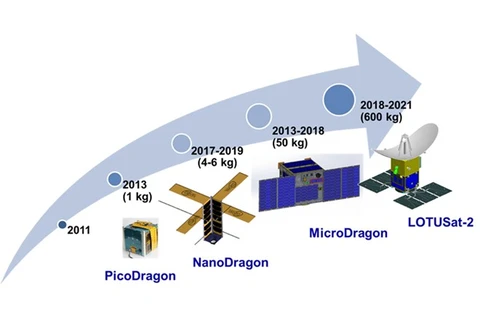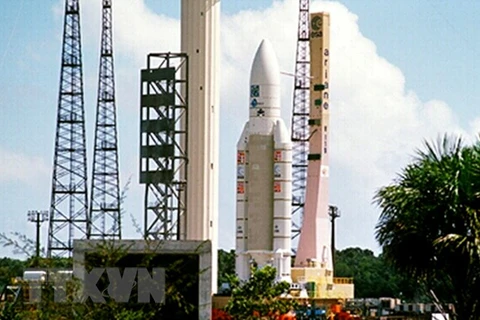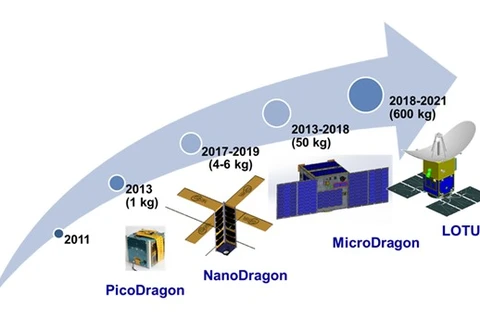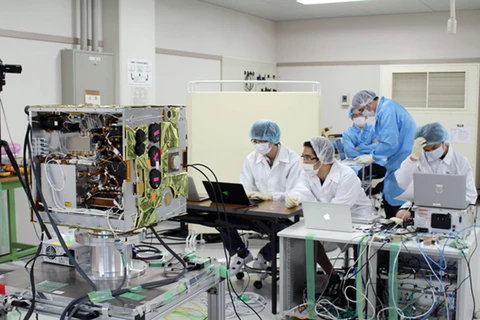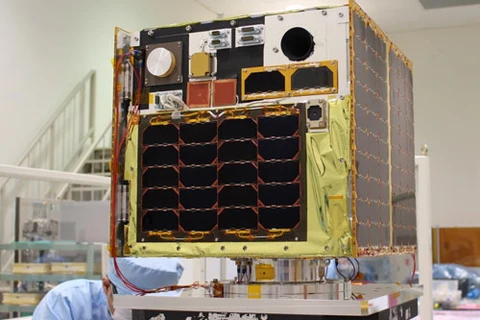Hanoi (VNA) – The made-in-Vietnam earth observation satellite MicroDragon will be launched into orbit by an Epsilon-4 rocket from the Uchinoura Space Centre in Japan’s Kagoshima Prefecture at 7:50am on January 18 (Hanoi time), one day later than scheduled due to unfavourable weather.
MicroDragon will be launched together with six satellites from Japan, and separate from the rocket after one hour and five minutes. It is expected to reach stable operations after one to three months.
The satellite was developed by 36 Vietnamese engineers from the Vietnam National Space Centre (VNSC) who were sent to study space technology at five of Japan’s top universities, namely the University of Tokyo, Keio University, Hokkaido University, Tohoku University, and the Kyushu Institute of Technology. The group began manufacturing the satellite in 2013, successfully completing and testing it in 2017.
The satellite, measuring 50x50x50cm and weighing 50kg, is designed to monitor the quality of water in coastal areas, locate fishery resources, and observe changes in the ocean to assist the national aquaculture sector. Also, it will help exchange database with the global microsatellite community to enhance capacity in response to climate change and natural disasters.
Previously, VNSC engineers successfully made a satellite named PicoDragon (10x10x11.35cm and 1 kg), which was launched into orbit in 2013.
As scheduled, after MicroDragon, Vietnam will manufacture LOTUSat-1 and LOTUSat-2 satellites with advanced radar technology, each weighing 600kg and measuring 1.5×1.5×3m with a five-year lifetime in orbit. The country is also developing a 10kg NanoDragon satellite. –VNA
MicroDragon will be launched together with six satellites from Japan, and separate from the rocket after one hour and five minutes. It is expected to reach stable operations after one to three months.
The satellite was developed by 36 Vietnamese engineers from the Vietnam National Space Centre (VNSC) who were sent to study space technology at five of Japan’s top universities, namely the University of Tokyo, Keio University, Hokkaido University, Tohoku University, and the Kyushu Institute of Technology. The group began manufacturing the satellite in 2013, successfully completing and testing it in 2017.
The satellite, measuring 50x50x50cm and weighing 50kg, is designed to monitor the quality of water in coastal areas, locate fishery resources, and observe changes in the ocean to assist the national aquaculture sector. Also, it will help exchange database with the global microsatellite community to enhance capacity in response to climate change and natural disasters.
Previously, VNSC engineers successfully made a satellite named PicoDragon (10x10x11.35cm and 1 kg), which was launched into orbit in 2013.
As scheduled, after MicroDragon, Vietnam will manufacture LOTUSat-1 and LOTUSat-2 satellites with advanced radar technology, each weighing 600kg and measuring 1.5×1.5×3m with a five-year lifetime in orbit. The country is also developing a 10kg NanoDragon satellite. –VNA
VNA

